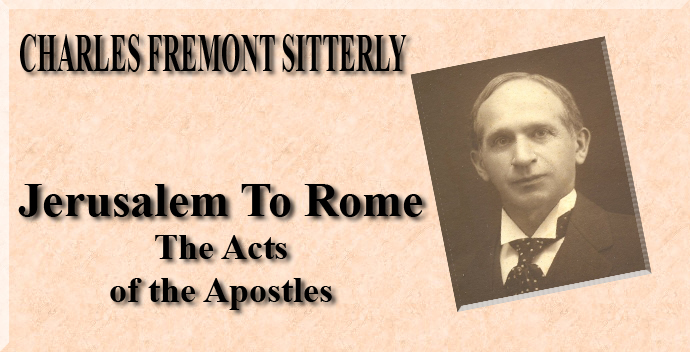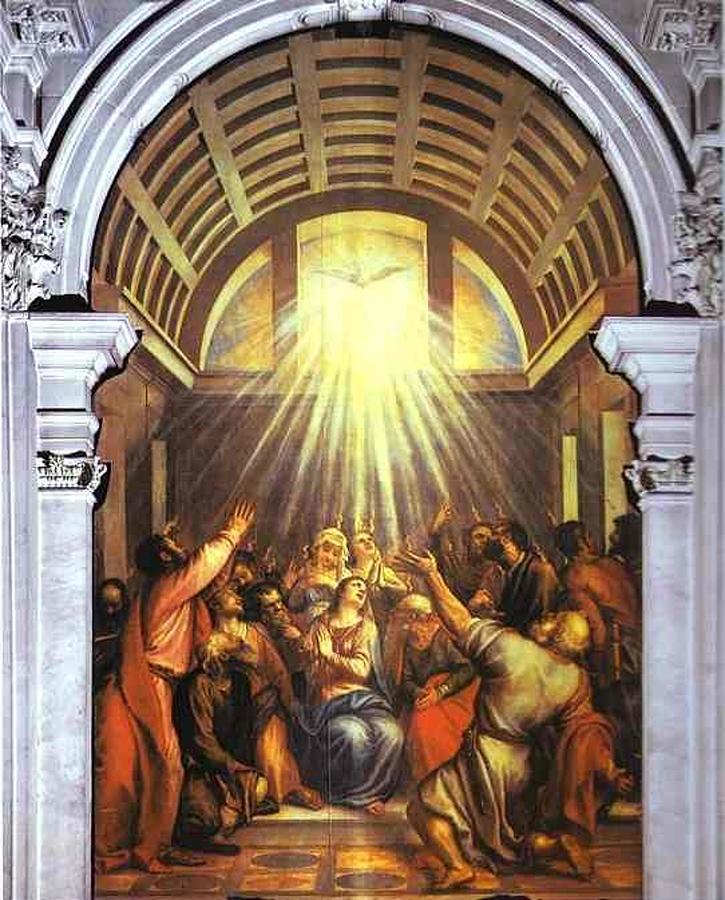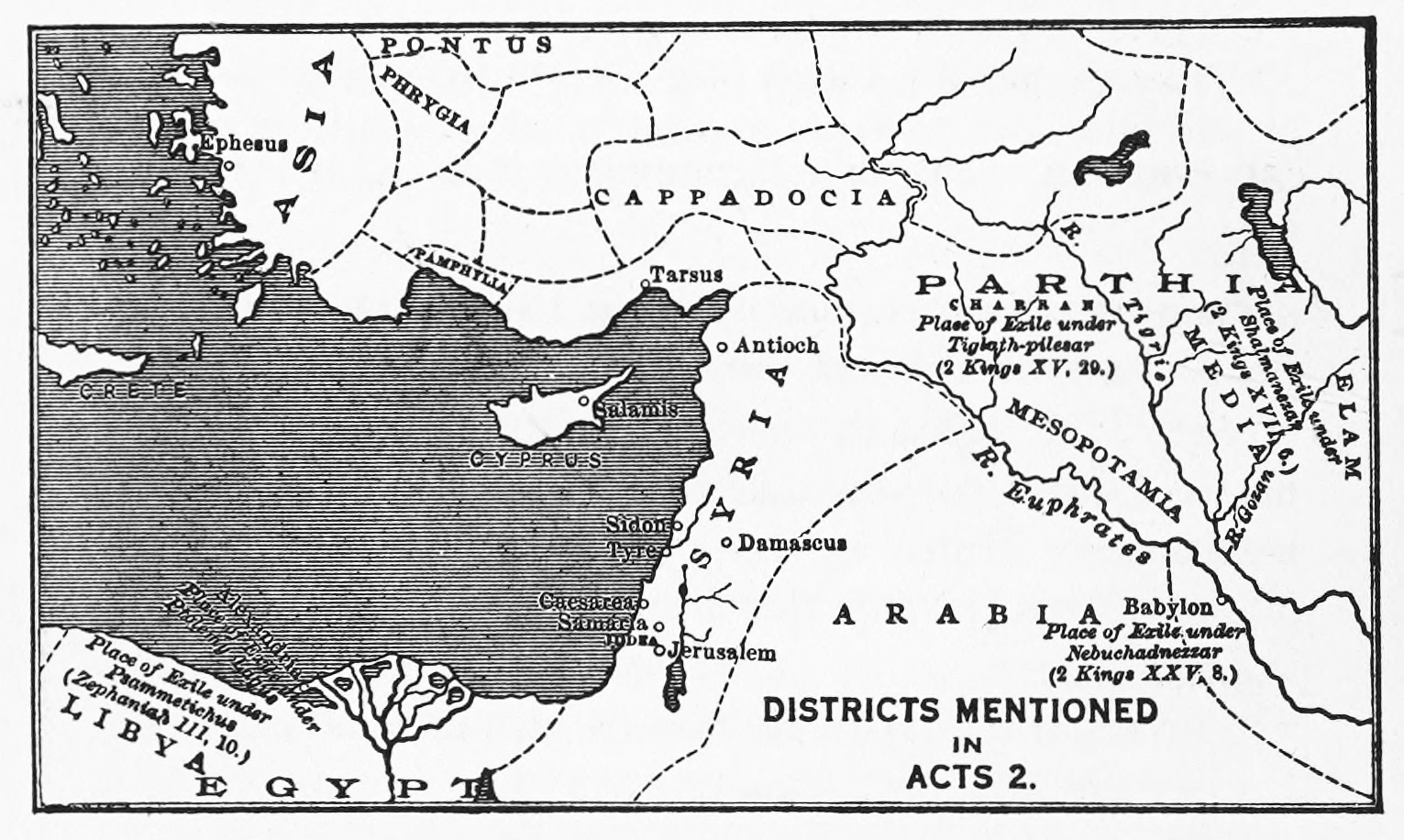|
On the arrival of the day of Pentecost, while they were all assembled together, suddenly there came out of the sky a sound just like a blast of wind coming nearer and nearer, till it filled the whole house where they were seated. Then they saw what looked like tongues of flame streaming‘out, and one settled on the head of each. All present were filled with the Holy Spirit and began to talk in other languages just as the Spirit gave them power to express themselves.
|
|
And now the time of preparation is past and the day of the new dispensation is come. The number of the Twelve has been restored, the sense of unity has risen into complete control and the one hundred twenty souls await the fulfillment of the Master’s promise with one mind.
The Advent of the Holy Spirit brings us to the main business of the book, indeed, to the main business of the Bible itself, which is to declare and set up the spiritual reign of God among men. This is that Kingdom of which Jesus had spoken always, and again on the day of His Ascension. Its times and seasons all merge into this one epochal moment. It is no longer future, it is come.
As Christ said to Nicodemus, “It comes like the wind, we know not whence or whither.” As the Baptist declared, it is not a baptism of cleansing water but of purifying fire. The outward tongues of flame symbolize the inward tongues of testimony, and the tongues talk because they have a witness to bear, but the language of the utterance is foreign to outward expectation. A new power has come upon the speakers. It is the Holy Spirit. The features appealing to eye and ear were real but unimportant, and, as Sir William M. Ramsay says, “Peter brushes aside the external, fastens on the inner meaning, and dwells on this alone” (Pictures of the Apostolic Church, p. 15). There appears to be every reason for classing this miracle with that called by Paul “The Gift of Tongues,” a sign granted to many of the early believers of special spiritual power, and not a little esteemed because of its mystical features. But he taught that the gift of the “interpretation of tongues” was to be preferred, and it would seem that we have here a good illustration in the case of Peter of this latter grace.
|
|
At that time there were staying in Jerusalem devoutminded Jews from every nation under the sun, and when this sound was heard the crowd came together wondering because each one heard them speaking in his own language. Every-one was astonished and said in amazement,
“Are not all these who are speaking Galilaans? How then does each of us hear them in his own native language? Parthians, Medes, Elamites, those living in Mesopotamia, in Judea, and Cappadocia, in Pontus and
Asia, in Phrygia and Pamphylia, in Egypt and the sections of Libya around Cyrene, visitors from Rome, both Jews and proselytes, Cretans and Arabians though we are, yet we hear them telling in our own languages the wonderful doings of God.”
Thus all were astonished and greatly perplexed, and they kept saying each to the other,
“What can this mean?”
Others, however, began to sneer.
“They are filled
up with new wine!’ they said.
|
|
The sound is heard very widely and, as it fortunately happens, by temporary as well as settled residents of Jerusalem, from the ends of the earth. Rushing in curiosity to the place of its source, they hear what further perplexes them to the point of amazement— Galileans speaking in as many different languages as their hearers possessed. As Pentecost was nearly two months later than Passover, it is believed that greater throngs attended this feast than the former. Sixteen different parts of the Roman empire are mentioned as contributing to the audience, and, although they are mainly Jews and pious men, yet they cannot accept unquestioned the proclamation even of the wonderful works of God by
Galilean artisans and fishermen. From those of the baser sort come gibes, charging the jubilation of the apostolic company to the spirits of new wine. This rouses strong protest from Peter and the Eleven and the leader’s apology is worthy of the extended space allotted to it. Ramsay well says, “This outline of an epoch-making address delivered on a memorable occasion stands in history as the first utterance of the new church; and as such is a document of the highest interest” (Pictures of the Apostolic Church, p. 12.
|
|
Then Peter, surrounded by the Eleven, stood up and spoke in a loud voice to them:
“Men of Judea and all you residents of Jerusalem, let this be known to you and mark well my words. For these are not drunk, as you imagine, since it is only nine in the morning! But this is what was foretold by the prophet Joel:
‛AND IT SHALL COME TO PASS IN THE LAST DAYS, SAITH GOD,
THAT I WILL POUR OUT MY SPIRIT UPON ALL FLESH, AND YOUR SONS AND YOUR DAUGHTERS SHALL PROPHESY,
AND YOUR YOUNG MEN SHALL SEE VISIONS AND YOUR OLD MEN SHALL DREAM DREAMS.
AND EVEN UPON MY SLAVES AND SLAVE-WOMEN IN THOSE DAYS
WILL I
POUR MY SPIRIT, AND THEY SHALL PROPHESY.
I WILL DISPLAY PORTENTS IN THE SKY ABOVE
AND SIGNS UPON THE EARTH BELOW,
BLOOD AND FIRE AND CLOUDS OF SMOKE
THE SUN SHALL BE TURNED INTO DARKNESS
AND THE MOON INTO BLOOD
BEFORE THE GREAT AND MANIFEST DAY OF THE LORD ARRIVES,
YEA, IT SHALL COME TO PASS THAT EVERYONE WHO CALLS UPON THE NAME OF THE LORD SHALL BE SAVED’ (Joel. ii, 28-32).
‘Listen, men of Israel, to these words of mine: That Jesus the Nazarene was a man of God was proved to you by miracles and portents and signs which God did among you through Him as you very well know. Yet this Jesus, betrayed to you in God’s definite plan and foreknowledge, you crucified and put to death by the hands of lawless men. God, however, raised Him up again, freeing Him from the pangs of death, since it was impossible that death should hold Him. For David says in reference to Him:
‘I
SAW THE LORD ALWAYS BEFORE ME,
LEST I SHOULD BE DISTURBED HE IS ALWAYS BESIDE ME.
ON THIS ACCOUNT MY HEART IS GLAD AND MY TONGUE EXULTS,
AND EVEN MY FLESH LIES DOWN IN HOPE.
For THOU WILT NOT LEAVE MY SOUL IN HADES
NOR LET THY HOLY ONE SEE CORRUPTION.
THOU HAST MADE KNOWN TO ME THE PATHS OF LIFE,
THOU WILT FILL ME WITH GLADNESS IN THY PRESENCE’ (Psa. xvi, 8-11).
“Brother men, I can surely speak freely to you about our Patriarch David, who, of course, died and was buried, and whose tomb is with us to this very day. Since, then,
he was a prophet, and knew that God had sworn an oath to him to establish one of his descendants upon his throne, he foresaw the event and spoke of the resurrection of the Christ, declaring that He was not left in Hades, nor did His flesh see corruption. This Jesus God raised up—of which we all are witnesses. Therefore having been raised to God’s right hand, and having received from the Father the promised gift of the Holy Spirit, He has poured out this which you are seeing and hearing. For David did not ascend into heaven, but he says himself,
‘THE LORD SAID TO MY LORD,
SIT AT MY RIGHT HAND
TILL I
PUT THINE ENEMIES BENEATH THY FEET’
(Psa. cx, 1).
“So, then, let all the house of Israel assuredly understand that this very Jesus, whom you have crucified, God has made both Lord and Christ.”
|
|
Peter seizes with masterly adroitness the charge of drunkenness and turns the tables successfully against that base accusation, and then swings over to the eminently respectable pietists and quotes with great ability and freedom from their favorite psalmists and prophets, and so powerfully does he plead his case that his appeals at the close appear to have swept a multitude of convinced men into penitence and true faith.
We cannot rightly judge this address by any of our modern standards. Even the apologies of Paul do not furnish proper parallel, unless, perhaps, those addressed solely to Jews, and even then he enjoys an atmosphere which Peter and others had already. created. When the time, the auditors, the circumstances, and the results are all taken into view it is clear, that Peter from the very first vindicates his Master’s confidence in appointing him bearer of the keys of the Kingdom. His use of the Scripture and his
manner of applying it show him to have been possessed of a mind richly stored with the letter of the Old Testament, and one that had accurately observed the matchless Teacher’s style in using it. The reference to David’s prophecy in the one hundred and tenth psalm is an exact parallel to Jesus’s use of the same passage in silencing the Pharisees. But the supreme virtue of Peter’s sermon is his unique and correct interpretation of one of the most apocalyptic prophecies of the Hebrew Bible. Here he attains at a single bound the highest plane of spiritual insight. Surely, the Holy Spirit is poured out upon Peter without measure. If only his immediate successors, and especially the apostolic Fathers, had grasped the principle here employed in the reading of like prophecies, what a world of misunderstanding and false teaching the church would have escaped! Even to this day but very few exegetes have learned to use Peter’s key to apocalyptic vision. Joel and Ezekiel and Daniel and Zechariah and Jesus and John only employ physical phenomena—blood, fire, smoke, winds, wheels, swords, beasts, birds, dragons, lamps, bowls, trumpets— as pictographic aids symbolically suggestive of infinitely higher things. The spiritual and not the physical, the eternal and not the temporal, the universal and not the particular, the racial and not the national, the unseen and not the seen—these are the things that abide. Decrees cannot silence, crucifixion cannot quench, death cannot kill souls inspired by the Holy Spirit; nothing shall by any means move them. Peter, though, is only one among his equals. The Twelve are only a tenth of the company of one hundred and twenty, and as these all with one accord give testimony to the supremest reach in human experience, namely, the conscious possession of the Spirit of God, they not only mightily stir the city in which they are assembled but soon advance to the capital of the Roman empire.
|
|
When they heard this they were cut to the heart and said to Peter and the rest of the Apostles,
“Brother men, what are we to do?”
“Repent!” answered Peter. “And let each of you be baptized in the name of Jesus Christ for the remission of your sins, and you will receive the gift of the Holy Spirit. For the promise is for you and for your children and for all who are afar, whomever the Lord our God shall call to Himself.”
And with many other words he kept witnessing and appealing to them.
“Save yourselves,” he urged, “from this crooked generation!”
Then those who gladly received his word were baptized; about three thousand souls were added to them on that very day. Moreover, they kept closely attending to the teaching of the Apostles and to fellowship, the breaking of bread and in praying together.
And a sort of fear fell on every-one while many portents and signs-were being done by the Apostles. All those believing kept together and shared everything in common. Moreover, they kept selling their property and their goods and dividing the proceeds among all as each might need it. Also day by day they met with common agreement at the Temple and broke bread together at their homes, eating their food with single-hearted joy, praising God, and regarded with favor by the whole populace, and the Lord added day by day to their number those who were being saved.
|
|
Peter’s last recorded word, boldly charging his hearers for the second time with the murder of their Messiah and the Source of this sign direct from His throne of His present exalted state, causes hundreds to cry out as with one voice,
“Brothers, what are we to do?”
“Repent,” answers Peter. “Do as we and many during the last
three years have done in response to the calls of John the Baptist and Jesus himself; be baptized as a sign of final break with this evil generation, and you too shall receive the gift of the Holy Spirit.”
Note that it is the possession of the Holy Spirit which crowns and seals the exhortation given. Penitence, baptism in water, and the forgiveness of sins are only preliminary and even negative acts in comparison with baptism of the Spirit from above. On that very day three thousand joyfully respond and join the central group in constant attendance upon the Apostle’s teaching, sharing in all respects their artless spiritual fellowship. Luke’s summary statement in the last five verses of the chapter no doubt covers a period of weeks, if not months. The type of spontaneous comradeship which sprang into life is in no respect inexplicable. Like states of spiritual-mindedness produce like reactions always and everywhere, as is seen in every home and community where the Holy Spirit is truly manifest. Such groups of believers, moreover, will always be looked upon with favor by all the people, and their numbers will increase in direct ratio to the
genuineness and depth of their spiritual living.
|



 Home
Home What's New
What's New Bible
Bible Photos
Photos Hiking
Hiking E-Books
E-Books Genealogy
Genealogy Profile
Free Plug-ins You May Need
Profile
Free Plug-ins You May Need
 Get Java
Get Java.png) Get Flash
Get Flash Get 7-Zip
Get 7-Zip Get Acrobat Reader
Get Acrobat Reader Get TheWORD
Get TheWORD
